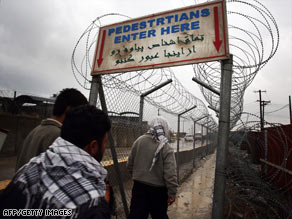
Alleged terrorists held at a U.S. military prison in Afghanistan can challenge their detention in federal court, a U.S. judge ruled Thursday.
District Court Judge John Bates denied a motion from the Obama administration to block four men from appealing their continued imprisonment. Each of the prisoners has been held at Bagram Air Field for six years or more. Bates concluded these cases “closely parallel” those of accused enemy combatants held in the detention facility at the U.S. naval base at Guantanamo Bay, Cuba, “in large part because the detainees themselves as well as the rationale for detention are essentially the same.” The Supreme Court last year ruled Guantanamo prisoners have a constitutional right to challenge their military custody in the federal court system. The Bush administration had argued the president retained broad war powers to detain accused terrorists indefinitely, while affording them limited hearings before military tribunals. Bush officials also argued civilian courts have limited jurisdiction to hear detainee appeals. The new administration has pulled back somewhat from those policies but has still argued foreign nationals held at Bagram have fewer rights than their counterparts in Cuba.
Don’t Miss
Yemeni held at Guantanamo since 2001 to be released
Obama keeps Bush view on Afghanistan detainees
The four men at the center of the appeal were reportedly captured outside Afghan borders. Among them is Haji Wazir, an Afghan citizen captured in Dubai, United Arab Emirates, in 2002 and held at Bagram ever since. Two others were captured in Thailand and Pakistan. It is unclear where the fourth man was captured. They all deny being terrorists. The lead case is al Maqaleh v. Gates (06-cv-1669).